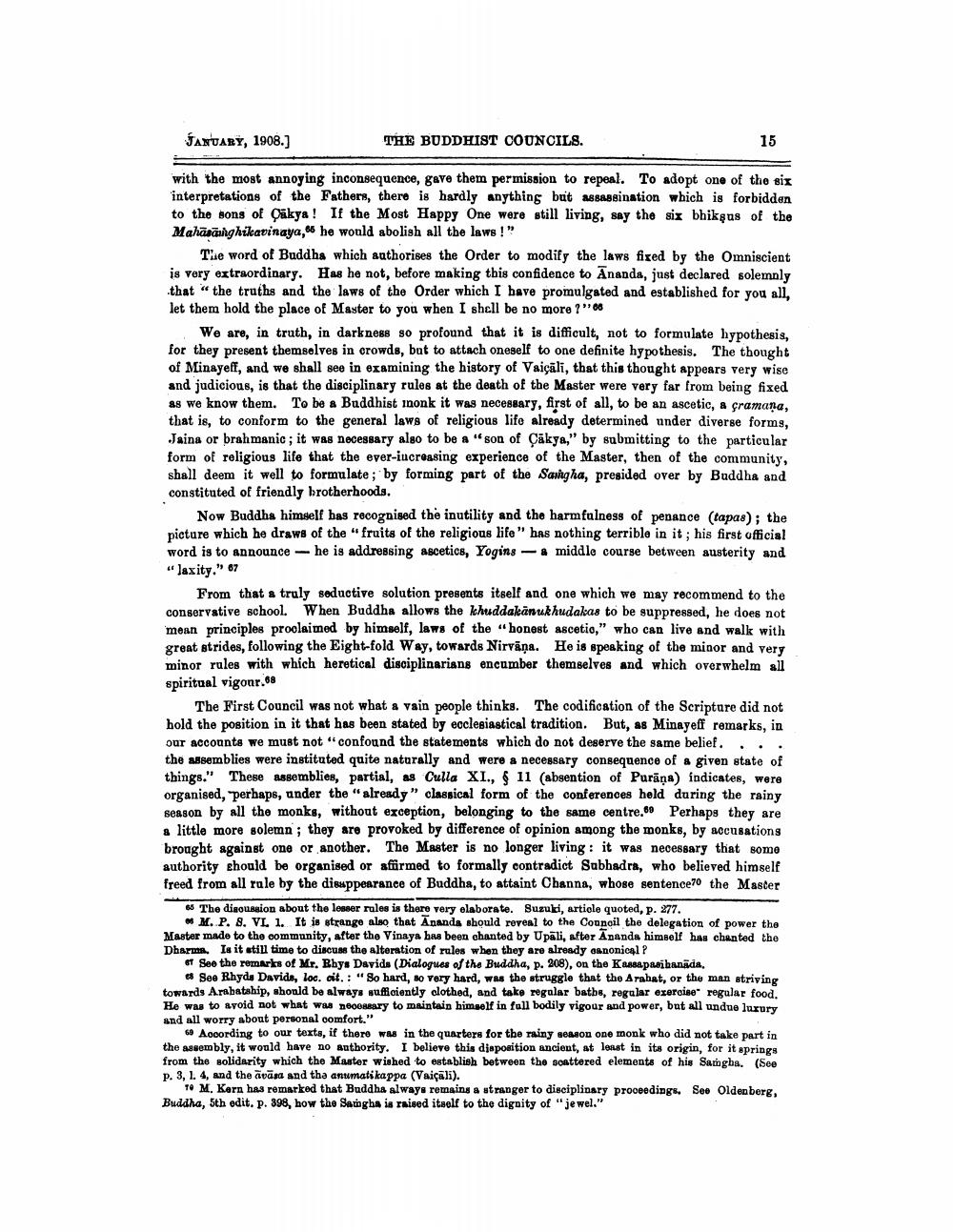________________
JANUARY, 1908.)
THE BUDDHIST COUNCILS.
with the most annoying inconsequence, gave them permission to repeal. To adopt one of the six interpretations of the Fathers, there is hardly anything but assassination which is forbidden to the sons of Cükya! If the Most Happy One were still living, say the six bhikşus of the Mahāsāinghikavinaya,66 he would abolish all the laws !"
The word of Buddha which authorises the Order to modify the laws fixed by the Omniscient is very extraordinary. Has he not, before making this confidence to Ananda, just declared solemnly that "the truths and the laws of the Order which I have promulgated and established for you all, let them hold the place of Master to you when I shall be no more ?"
We are, in truth, in darkness so profound that it is difficult, not to formulate hypothesis. for they present themselves in crowds, but to attach oneself to one definite hypothesis. The thought of Minayeff, and we shall see in examining the history of Vaicāli, that this thought appears very wise and judicious, is that the disciplinary rules at the death of the Master were very far from being fixed as we know them. To be a Buddhist inonk it was necessary, first of all, to be an ascetic, a cramana, that is, to conform to the general laws of religious life already determined under diverse forms, Jaina or brahmanic; it was necessary also to be a "son of Çakya," by submitting to the particular form of religious life that the ever-iucreasing experience of the Master, then of the community, shall deem it well to formulate; by forming part of the Sangha, presided over by Buddha and constituted of friendly brotherhoods.
Now Buddha himself has recognised the inutility and the harmfulness of penance (tapas); the picture which he draws of the fruits of the religious life" has nothing terrible in it; his first official word is to announce - he is addressing ascetics, Yogins -& middle course between austerity and "laxity." 87
From that a truly seductive solution presents itself and one which we may recommend to the conservative school. When Buddha allows the Ichuddakanukhudakas to be suppressed, he does not mean principles proolaimed by himself, laws of the honest ascetio," who can live and walk with great strides, following the Eight-fold Way, towards Nirvāņa. He is speaking of the minor and very minor rules with which heretical disciplinarians encumber themselves and which overwhelm all spiritual vigonr. 68
The First Council was not what & vain people thinks. The codification of the Scripture did not hold the position in it that has been stated by ecclesiastical tradition. But, as Minayeff remarks, in our accounts we must not "confound the statements which do not deserve the same belief.... the assemblies were instituted quite naturally and were a necessary consequence of a given state of things." These assemblies, partial, as Culla XI., $ 11 (absention of Purāņa) indicates, were organised, perhaps, under the " already” classical form of the conferences held during the rainy season by all the monks, without exception, belonging to the same centre.80 Perhaps they are a little more solemn; they are provoked by difference of opinion among the monks, by accusations brought against one or another. The Master is no longer living: it was necessary that some authority should be organised or affirmed to formally contradict Subhadra, who believed himself freed from all rule by the disappearance of Buddha, to attaint Channa, whose sentence70 the Master 6 The discussion about the lesser rules is there very elaborate. Suzuki, article quoted, p. 277.
M.P. 8. VL 1. It is strange also that Ananda should reveal to the Coupoil the delegation of power the Master made to the community, after the Vinaya bas been chanted by Upali, after Anands himself has chanted the Dharma. Is it still time to discuss the alteration of rules when they are already canonical?
T See the remarks of Mr. Rhys Davids (Dialogues of the Buddha, p. 208), on the K8.48&pasibanada,
. See Rhydo Davide, loc. cit.: "So hard, so very hard, was the struggle that the Arahat, or the man striving towards Arabatship, should be always sufficiently clothed, and take regular baths, regular exercise regular food. He was to avoid not what we noobssary to maintain himself in full bodily vigour and power, but all undue luxury and all worry about personal comfort."
According to our texts, if there was in the quarters for the rainy season one monk who did not take part in the sembly, it would have no authority. I believe this diaposition ancient, at least in its origin, for it springs from the solidarity which the Master wished to establish between the souttered elements of his Satogha. (See p. 3, 1. 4, and the avāsa and tha anumati kappa (Vaicāli).
To M. Karn has remarked that Buddha always remains a stranger to disciplinary proceedings. See Oldenberg, Buddha, 5th edit. p. 398, how the Samgha is raised itself to the dignity of "je wel."




